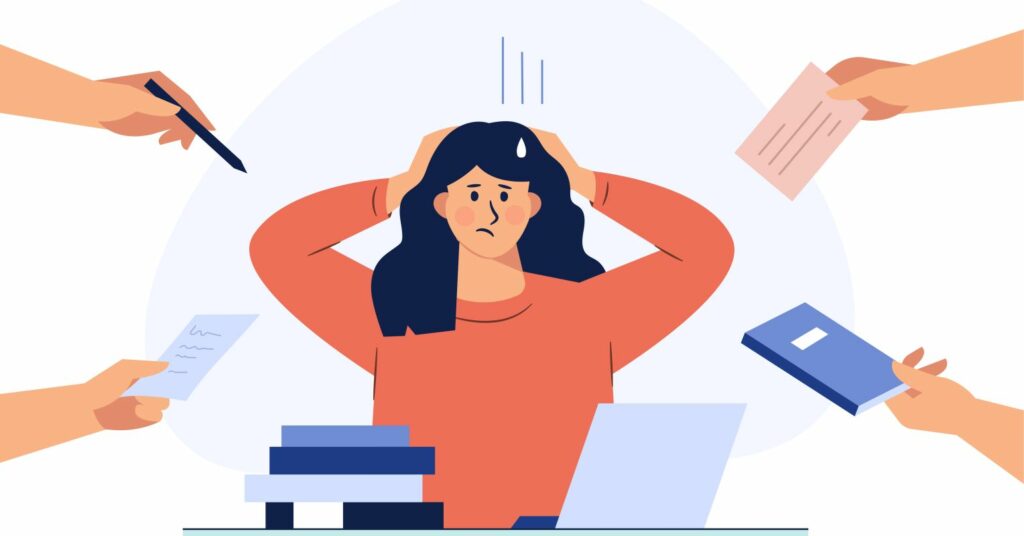The world’s leading medical authorities—including the World Health Organization, US Surgeon General, and UK National Health Service—are now in consensus that levels of loneliness and social isolation have increased to unprecedented levels and that the challenges comprise a grave public health threat.
But there’s still uncertainty about a basic question: What’s driving the crisis?
Reports including Surgeon General Vivek Murthy’s advisory on loneliness and social isolation point to a range of factors including the rise of constant digital connectivity, the widespread loss of face-to-face connection, a decline of community institutions like churches and sports clubs, and an increasingly individualistic culture driven by values like social media status-seeking. All these factors are contributing to the problem.
But one of the biggest issues driving loneliness and social isolation is perhaps the simplest.
We’re stressed out.
Prominent research organizations, including Gallup, have found that levels of stress and worry have reached unprecedented levels in recent years.
And stress is antithetical to belonging.
This year marks the 30th anniversary of a book that changed the way society sees the problem of stress. Why Zebras Don’t Get Ulcers—a groundbreaking examination by Stanford neuroscientist and primatologist Robert Sapolsky—comprehensively documented how stress isn’t just an unpleasant emotional state or a cause of high blood pressure. It’s a driver of a wide range of other mental and physical health conditions.
“For the vast majority of beasts on this planet, stress is about a short-term crisis, after which it’s either over with or you’re over with,” Sapolsky wrote. Humans, in contrast, “so often activate a physiological system that has evolved for responding to acute physical emergencies, but we turn it on for months on end, worrying about mortgages, relationships, and promotions.” We’re not suited—mentally or physically—to endure constant stress.
A growing body of research has validated Sapolsky’s thesis. Stress is now a key driver of the leading causes of death in the U.S. including heart disease and type-2 diabetes. It’s a major issue for long-term mental stability, cognitive ability, and productivity. Recent research shows that stress is a major factor in the development of the parts of the brain responsible for impulse control and moral and ethical discernment.
Beyond degrading bodily organs, stress can make us distrustful and even selfish.
Take a moment to think back to a moment when you were really stressed. What does deep stress feel like in your body and mind? What does it do to your sense of connectedness to other people?
I can speak from my own experience: In moments when I’m really stressed, my field of perception narrows. My breath gets shallow. I stop thinking about how I can listen better to others or how I can help another person or deepen my relationships. Rather, I develop a single-minded focus on getting out of the stressful situation. The fight-or-flight response inhibits our ability to connect.
In a culture where stress is a normal state of being, it’s natural to experience a sense of “time poverty,” where every minute of the day needs to be scheduled toward productive pursuits, and we can scarcely afford the time to connect with friends and loved ones—or to connect with our own self in calm reflection. Over time, the cumulative effects of stress can manifest as overwhelm and burnout—conditions that further limit our ability to connect.
If we want to overcome the crises of loneliness and social isolation that are driving a wide variety of shared challenges, then we need to reexamine the societal values and even the public policies that are giving rise to widespread stress. Our current levels of stress are the direct result of conscious choices we’re making about the structure of our economy and society.
For example, Sapolsky’s work paints a clear picture of the relationship between stress and economic inequality. “If you want to see an example of chronic stress, study poverty,” Sapolsky says. He and other researchers have found that it’s not just the direct experience of deprivation, or uncertain access to health care, that creates chronic stress—it’s also the psychological experience of poverty amidst plenty. This speaks to how policies like high-quality universal healthcare, free childcare, paid leave, and other programs explicitly reduce the levels of stress that people—particularly people in poverty—are subject to feel.
Beyond questions of equity, there are also day-to-day shifts in the structure of our economy that are heightening stress. Think of our norms around professional availability. While nearly everyone once left their work responsibilities at the workplace, the rise of round-the-clock email access has created stressful new expectations. Social media creates pressures that demonstrably heighten stress. This is the age of always-on.
Nearly a century ago, the economist John Maynard Keynes imagined that unprecedented economic growth would enable unparalleled new levels of human leisure. All the new productivity from industrial machines would free up human time for relaxation and voluntary creative pursuits. But just the opposite has happened. While the rise of AI and related technologies will reduce the need for human labor even further, it’s still an open question whether the innovations will boost human flourishing or merely exacerbate stress. It’s up to us to decide which values we will prioritize. For example: If we made stress management an explicit goal of public policy, we could create measures and benchmarks for how to amplify ease and connection.
Of course, some stress can be positive. It’s valuable if it catalyzes action toward meaningful life goals. But so much of the stress that’s rising today is what can be described as distress—prolonged feelings of overwhelm and disequilibrium that are not necessarily in service of our higher values and aspirations.
The consequences—including loneliness, social isolation, and health challenges—are clear.
To build resilience in an age of rising stress, we need to honour the value of joy, ease, and genuine connection.
Source link : https://www.psychologytoday.com/za/blog/the-power-of-belonging/202410/stress-is-driving-an-epidemic-of-social-isolation
Author :
Publish date : 2024-10-09 14:53:06
Copyright for syndicated content belongs to the linked Source.
